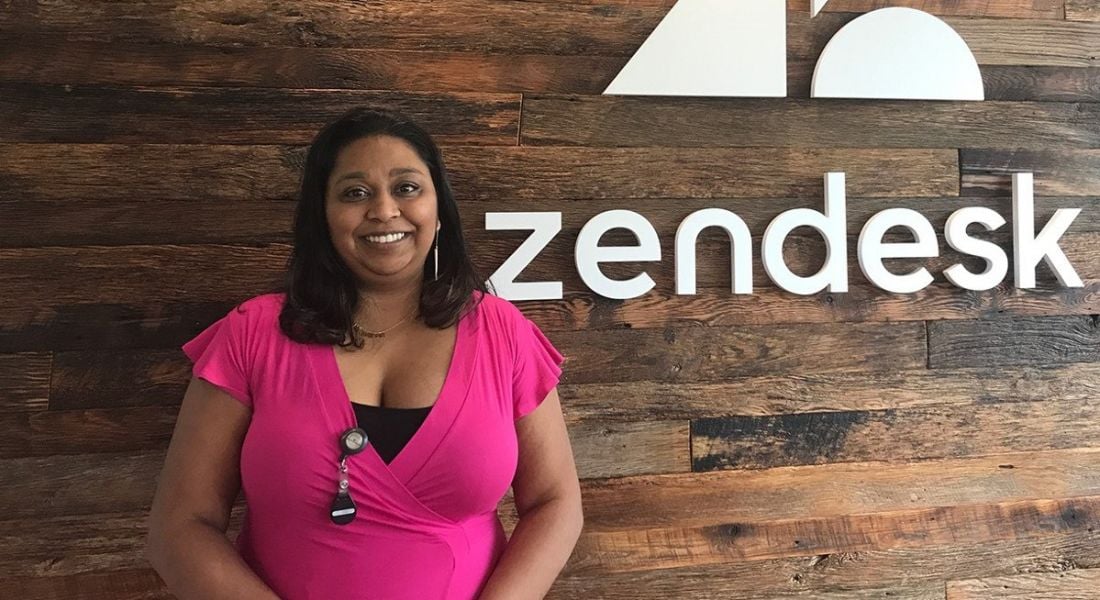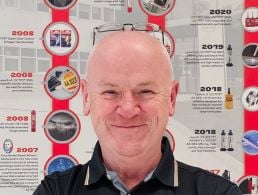Sheeka Patak, a back-end engineer at Zendesk, discusses her experience getting into coding and what she believes needs to change in STEM.
Sheeka Patak would describe her coding background as “very non-traditional”. As someone who is a self-taught programmer and who came to the industry after taking a coding course during a period of unemployment, aspects of working at a place such as Zendesk took some getting used to.
What drew you to this web development?
Even though I’ve always loved computers, I took a long time figuring out that this was what I wanted to do with my life.
I grew up under the impression that programming was for people who were good at maths (and I hated maths in school) – that’s not true at all.
Learning to code and working as a software engineer is about problem-solving. You’re solving a different puzzle each day and, to me, that makes it an exciting and engaging job.
What’s the best thing about working in this area?
It’s constantly evolving. It’s such an innovative sector that the technologies you use are improving and changing all the time.
Combine that with the problem-solving nature of the job and you’re never going to be stuck doing the same thing for one week, never mind year after year.
It’s far from the stereotypical office job; it’s the kind of job and career where you are constantly offered opportunities to learn and improve your skills and knowledge.
What’s the most exciting development you’ve witnessed in your sector since you started working in it?
I don’t think I can point to one specific thing. To me, the research and development that’s been going into AI and machine learning is incredibly exciting.
But what’s even more exciting is seeing these fields beginning to integrate with other sectors and sciences, and seeing these collaborations increasingly in the forefront of the news.
I’m really looking forward to seeing how the agriculture, medical and technology sectors all work together to solve some of the world’s toughest problems.
What aspect of your job did you struggle to get to grips with?
I come from a very non-traditional background. When it comes to programming, I’m almost completely self-taught.
As a result, learning how to work on large projects took a lot of getting used to. The techniques that you initially teach yourself on a small scale – like debugging and how to investigate a problem – suddenly need to be applied to significantly larger codebases, and rehoned to be efficient on such large projects.
For me, this part of my job is still a work in progress, and I continue to try and learn from the amazing people I’m surrounded by every single day.
What’s been the hardest thing you’ve had to face in your career, and how did you overcome it?
Learning that it’s OK to not know the solution to a problem straight away. When I first started, I was so afraid to make changes to existing codebases without knowing exactly what needed to be changed first.
Eventually, with a bit of experience and after learning from some of my colleagues, I realised that it was OK to not know the answer right off the bat. Even the best engineers sometimes need to do a bit of investigating before they know how to approach a problem.
Learning how to just dive into a codebase and make changes as a way of figuring out how stuff works was difficult but, with some help from my teammates, it’s something I feel much more comfortable doing now.
If you had the power to change anything within the STEM sector, what would that be?
I feel like diversity is a bit of a clichéd answer, but it’s still my answer.
A lot of the problems this sector faces can be traced back to a lack of diversity. I’m not referring solely to the gender imbalance here – there are a lot of other minorities that get overlooked.
I feel like the sector can be a little ableist at times. We should also aim to be an inviting and attractive sector to work in for people from the LGBTQ community as well, and to people of all ages and ethnicities.
Which of your personality traits makes you best suited to your job and this sector?
I’m so stubborn! In most situations, it’s something I need to actively work on curbing, but I think that any trait that helps you keep picking at a difficult problem until it’s solved is something that will help you in this industry.
I’m a little bit creative as well, or like to think I am! I think this helps when it comes to thinking outside of the box and figuring out the best solution to a problem.
Is there something in your personal life that helps you/has helped you in your job?
I have an enormously supportive family. Maybe they don’t have that much of an impact on my current job but they were so patient and understanding of my desire to pursue this as a career.
In fact, I have my sister to thank for setting me down this path initially, since she was the one who pointed out trying a coding course when I was unemployed and wondering what to do with my life.
How do you make connections with others in the STEM community?
I attend as many meet-ups and conferences as I can. I also try to get involved in hosting or organising events wherever possible.
If the thought of public speaking makes you break out in an allergic reaction, getting involved in organising workshops, meet-ups etc is a great way to meet knowledgeable and experienced people in the community.
Has mentorship or coaching been important in your career?
Extremely important!
I feel like I should take the time to point out that there’s many kinds of mentorship. Some companies offer a dedicated mentorship programme and, if something like that is available, I think you should jump on it regardless of your level.
You can also get brief mentorship by attending workshops, conferences or being involved in forums like Reddit and Stack Overflow.
The most common sort of mentoring though, is the kind you get from your immediate team. In this respect, finding the right team is essential. The correct team will include people more experienced than you, who are willing to help you in whatever capacity is needed.
When I first came to Zendesk, I needed a lot of mentoring because it was my first time working on a such a large codebase.
I don’t need as much help any more, but I have a team that is willing to explain when I don’t understand something and, sometimes, points me towards something that might help me achieve my goals without me asking for it.
My team leader saw me studying and recommended a book other than the one I was using. I’ve been trying to learn a new programming language and he pointed me towards a book discussing some principles of software engineering. It wasn’t directly related to the language I wanted to learn but, from working with me, he knew there were gaps in my knowledge that needed filling and, once rectified, would help me learn any and all the languages I wanted with much greater ease.
Finding that kind of support is difficult but definitely worth actively hunting for. The right team will be an invaluable aid to you.
What advice would you give to someone thinking about a career in your area?
Be patient! If you’re starting out, the learning curve is steep. If you’re serious about becoming a software engineer, the rewards for sticking it out are well worth it.
Being open to critique is also something you need to be able to do – it’s an integral part of being a software engineer. Good communication skills are something important, so being able to handle critique gracefully and graciously will really help you.
Lastly, be brave! You will always, always be surrounded by incredibly intelligent and incredibly experienced people who are charismatic and unafraid to voice their opinion.
You need courage to speak your mind in that sort of environment, especially if you’re just starting out. So, take a deep breath, hold your head high and always back yourself!




